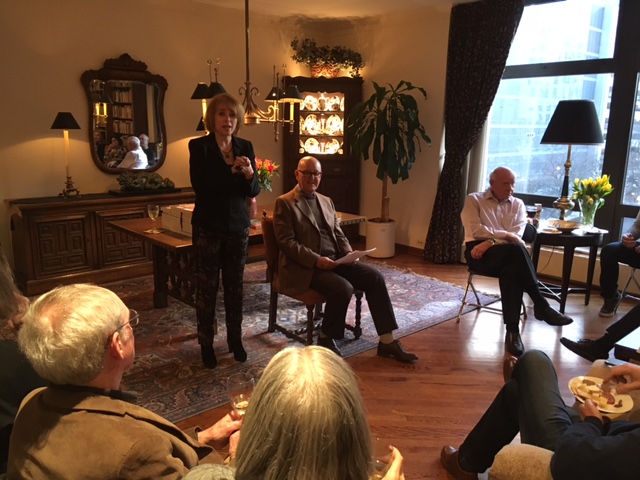Marching In Solidarity, But Not “In Fashion”— Why Didn’t Vogue Call Me?
/On January 27 I wrote a blog titled “A 48-Year Déjà Vu” about the similarities between the post-election Women’s March and the march to end the war in Vietnam in Washington DC on November 15, 1969. I’d been at both and have just finished a novel about the latter.
I commented on the longtime gap between issues that were compelling enough to get me back on my feet, and the “wake up” from my “radical sleep.” To illustrate my argument, I’d carefully combed through a circa ’69 photo of me in a protest march and lined up a corresponding shot from today.
The post was heartfelt. I received many comments (yes, a few about my hair) and reestablished connections from long ago. We were still all in it together.
Out Of Fashion, But Not Out Of the Question
Recently, in the May issue of Vogue magazine, of all things, I turn to a page labeled “Nostalgia” and see an article titled “March With Me,” comparing the author’s dual experiences of marching in DC long ago against the war, and this January against the potential loss of women’s rights. Great minds, yes?
Photo credit: Vogue
However, next to the article was a photo of what can only be called a Yardley girl from the ‘60’s. She’s what we all wanted to look like—doe-eyed, with long, stick-straight hair and hip clothes of the moment. Though the caption indicated she thought her “protesting outfit” was the essence of cool—bell bottoms and turtleneck—I was incredulous. This shot had all the benefits of professional hair, makeup and lighting, as well as a stylist who hung those sunglasses so insouciantly low on that skinny circumference of a hip. And the arch of her wrist as if she’d just flipped that glossy hair—seriously? She wouldn’t have lasted a mile marching in that getup.
But I read the article anyway and was surprised at how much our experiences had in common. The author, Pilar Crespi, had participated in the anti-Vietnam War March on Washington of 1967. That was two years before the one I attended and prior to the outrage of the Tet Offensive, The Democratic Convention and the assassinations of Martin Luther King and Bobby Kennedy that jolted my class out of high school at the end of 1968 into a truly frightening world.
As I read her story, and as I’ve recounted in previous blogs, I kept thinking about how so little changes, so few lessons are learned and the hamster wheel of history just keeps going around. Pilar’s (I’ve now forgiven her photogenic self) experiences were spot on with my own. Despite the photo caption, her actual ’67 march outfit consisted of “genuine” bells and a blue work shirt—I had one of those, but marched in ‘69 in a fatigue jacket found in a Salvation Army resale shop in the small town where my University was located.
Like Pilar’s mother, mine had also been appalled by my evolving radical appearance, pointing how much more flattering my previous stretch pants and mohair sweaters had been versus these clunky jeans. My mother just didn’t get how much clothes credentialed you in those times. I also didn’t tell my mother I’d gone to Washington—well, not until after the fact, when the phase I was in required appropriate mom-baiting.
The tone of our ‘60’s marches was also the same—male—and the focus, early feminist “lady-like.” We never would have worn pink (that was for out-of-touch sorority girls), made anything solely a women’s issue (we were equal in the struggle), or discussed body parts of any kind. In this year’s Women’s March, the tone was welcoming and friendly, the colors politically pastel, the men supportive, and the anatomy right up there in all the made-for-TV posters and on our pussy-hatted heads.
We had even both been spurred by the Women’s March to call our congress representatives about the same issues—the Muslim travel ban and the Affordable Health Care Act. We were SO aligned.
We Still Have the Power To Galvanize
My in-the-day fashion moment
Photo credit: Karen Thompson
What struck me above all, was how Pilar noted that our focus back then had been singular—to end the war, a generation-galvanizing stance that ultimately touched us all. Today, we’re both concerned about the multiplicity of the urgent issues—from the environment and women’s rights to immigration—and question how we’ll focus to make the proper impact on each. I wonder, is there a thread we can work through and pull these concerns together like we did over the Vietnam War?
That observation is similar to my additional concern about diversity. At the Women’s March in Chicago each speaker welcomed in turn every potential subsection represented by the women’s faces in front of her--transgender, queer, Hispanic, immigrant, previously incarcerated, single mothers, African Americans, victims of abuse, etc.—versus our overarching, and all encompassing female umbrella. And yet, SISTERS, it’s our commonalities that will provide the strength for change, not all these differences, right?
Finally, though both Pilar and I had been warmed by seeing the daughters and granddaughters who marched alongside us in January, we are objective about the difficulties for the quest ahead. Can we galvanize to the same degree as in the ‘60’s and fit all our issues, however diverse, under one powerful effort?
We can figure this out, Pilar. We have this in common—with our generation, with our gender.
So, I’ll bury the hatchet over your radical-chic and admit you were/are Vogue worthy. My look, back in the day I’d say was March worthy, save a few sporadic fashion moments.
Do you think there’s a photo shoot in it?
Any chance you hung on to that cute little tunic? I’m afraid my hat bit the dust long ago.







